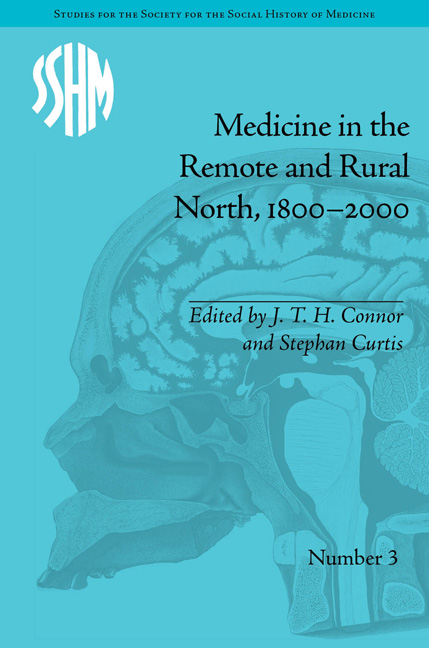Book contents
- Frontmatter
- CONTENTS
- Acknowledgements
- List of Contributors
- List of Figures and Tables
- Introduction: Cores/Peripheries – Rural/Remote: Medicine, Health-Care Delivery and the North
- Part I Remote Medicine and the State
- Part II Doctors and Doctoring in Remote Areas
- Part III Women, Health Care and the Practice of Medicine
- Notes
- Index
Introduction: Cores/Peripheries – Rural/Remote: Medicine, Health-Care Delivery and the North
- Frontmatter
- CONTENTS
- Acknowledgements
- List of Contributors
- List of Figures and Tables
- Introduction: Cores/Peripheries – Rural/Remote: Medicine, Health-Care Delivery and the North
- Part I Remote Medicine and the State
- Part II Doctors and Doctoring in Remote Areas
- Part III Women, Health Care and the Practice of Medicine
- Notes
- Index
Summary
This collection of essays emerged from a conference held at Memorial University in St John's, Newfoundland, in 2007 in recognition of the Fourth International Polar Year (IPY). One theme of the IPY was the investigation of the ‘cultural, historical and social processes that shape the resilience and sustainability of circumpolar human societies, and to identify their unique contributions to global cultural diversity and citizenship’. The maintenance of health and treatment of illness and accidents in locations such as northern Scotland, Scandinavia, Finland, Russia and northern Canada, and coastal regions such as Newfoundland and Labrador can certainly be easily linked to notions of human ‘resilience and sustainability’ (even if some of these northern locales are not circumpolar).
Of course climate, topography, cultural animosities or at least suspicions between providers and recipients of health care, and the financial capacity of various governments in other remote areas of the world, all shaped what could be done just as they do today. The essays in this volume focus on northern, polar societies but the strength of this collection is best demonstrated by envisioning ‘the North’ not solely as a unique geographical part of the world. Of course it is that but it also kindles in us images of numbing cold, and constant hardship and isolation on the one hand, and of opportunity, excitement and welcome solitude on the other.
- Type
- Chapter
- Information
- Medicine in the Remote and Rural North, 1800–2000 , pp. 1 - 18Publisher: Pickering & ChattoFirst published in: 2014

